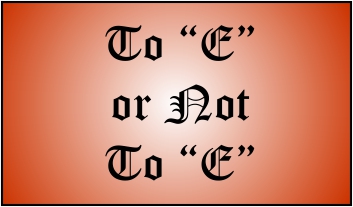
by Barbara Casey | Aug 22, 2015 | Spelling & Grammar Rules, Tutorials
Judging or Judgeing? Desirable or Desireable? Argument or Arguement?
A word that ends with a silent “e” can present a challenge when you try to make a new word by adding a suffix after it (letters added to the end of a word). Do you keep the “e” or drop it?
For example, when you want a noun to become an adjective and vice versa, do you keep the “e” or drop the “e”? It’s easy to make a spelling mistake with these words because they look funny either way.
Does desire become “desireable” or “desirable?” One that catches me up sometimes is “saleable” versus “salable.” Neither looks logical… so I usually have to look it up in my Collegiate Dictionary.
But now I have the rules… and here they are:
To E or Not to E?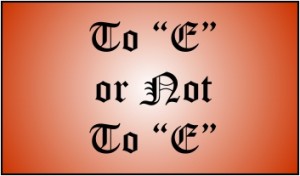
(1) When adding a suffix that starts with a vowel – such as ism, ing, able or ible – you drop the “e” as a general rule.
So judge becomes judging (not judgeing); come turns into coming (not comeing), the aforementioned sale is now salable (and not saleable); true becomes truism; desire turns into desirable; mistake is now mistaking… and so on.
(2) There’s always an exception to spelling rules in English:
When the word ending with a silent “e” has a soft “ce” or “ge” ending and you want to add the suffix “able” or “ous” – then you get to keep the “e.”
Examples are:
advantage > advantageous
change > changeable
enforce > enforceable
courage > courageous
notice > noticeable.
(3) If, however, you are adding “ing” to the present participle of verbs like “singe,” “tinge,” or “dye,” you keep the final (silent) “e.” Hence we have “singeing,” “tingeing,” “dyeing,” and “eyeing.” (This dyeing has to do with changing the color of something; when spelled “dying,” it’s a loss of life.)
(4) Then again, if your suffix begins with a consonant, you keep the silent “e.” It works this way for endings such as “ment,” “ful,” “ly,” and “ty.” So you have encouragement, extremely, lonely, ninety and useful.
(5) EXCEPT for… acknowledgment, argument, duly, judgment and truly, where you drop the “e.”
One rule – with at least 4 exceptions. I wonder who can remember them all?

by Barbara Casey | Aug 22, 2015 | Spelling & Grammar Rules, Tutorials
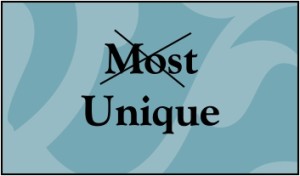
Her Style Was Most Unique… NOT!
A common usage mistake in English is to use the word “unique” in a way that makes the noun it modifies seem not unique.
When we say “most unique” or “very unique” about something, what we’re really saying is the thing isn’t unique at all.
The word “unique” means something is without equal or there is nothing else like it. So there is no “uniquer” option. A thing is either unique or it isn’t. There is no continuum for uniqueness.
We wouldn’t say, “Joey wore the most unique Halloween costume,” implying it was just a tad “more unique” than someone else’s. We’d say, “Joey wore a unique Halloween costume.” It’s giving credit where credit is due.
Dangling Modifiers – Ack!
If you’re a writer, and not getting Bob Bly’s newsletter, it’s worth checking out at www.bly.com.
Here’s a tip from Bob’s ezine about dangling modifiers – you know, when you start a sentence talking about one person and slide in a reference that refers to someone else altogether… and then end the sentence referring back to the first individual.
For example:
WRONG: “As a policyholder, I want you to know that you can reduce your premium by 50% this year.”
CORRECT: “As a policyholder, you can reduce your premium by 50% this year.”
“Try To” versus “Try And”
The correct usage is “I will try to fix it” rather than “I will try and fix it.”
While the latter usage now has its foot in the door in more relaxed writing, when you’re writing in a more formal situation, “try to” is the right version to use.
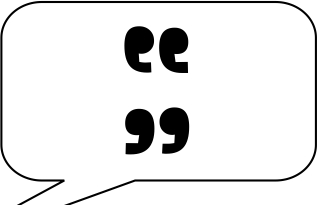
by Barbara Casey | Aug 22, 2015 | Spelling & Grammar Rules, Tutorials
Do commas, periods, colons, semi-colons, exclamation points and question marks go before or after quotation marks?
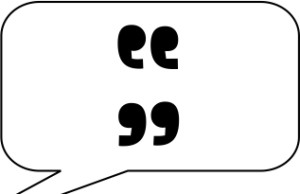
There are many different ways to use quotation marks and, in this tutorial, we’ll look at sentence punctuation in relationship to quotations. In other words, does the comma, period, question mark or exclamation point come before or after the quotation marks?
Rule for commas and periods
With commas and periods, the quotation marks go after the comma or period:
“I love you,” said Mary.
John replied, “I would follow you to the moon.”
Rule for semi-colons and colons
If you’re using a semicolon or colon, you place the quotation marks before the semicolon or colon:
I asked you the “question of the year”: do you love me?
Malcolm was “fit to be tied”; he had just missed the last bus home.
Where to put question marks and exclamation points
With a question or exclamatory sentence, place the quotation marks after the the question mark or exclamation point:
“Do you love me?” asked Mary.
“You do love me!” Mary gushed.
Exception
However… if you’re using a question mark or an exclamation point around a specific word, rather than enclosing a sentence, the quotation marks go before.
Do you even know the meaning of the word “love”?
It’s a girl – and her name is “Mary”!

by Barbara Casey | Aug 22, 2015 | Spelling & Grammar Rules, Tutorials
Loan and lend are misused so frequently – even in print and TV advertising – that it’s no wonder so many of us get the word usages mixed up. Loan is a noun; lend is a verb. That’s the bottom line.
Loan is a noun:
- I asked the bank for a loan.
Lend is a verb:
- Will you lend me some money?
Incorrect: The bank will loan me $100,000 to buy a house.
Correct: The bank will lend me $100,000 – or – The loan from the bank is for $100,000.
Incorrect: I loaned her my best sweater.
Correct: I lent her my best sweater.
When I’m in doubt about a correct word usage, I look in my The Chicago Manual of Style . It’s got everything.
. It’s got everything.
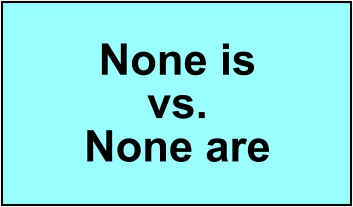
by Barbara Casey | Aug 22, 2015 | Spelling & Grammar Rules, Tutorials
Singular Verb or Plural Verb? What are the rules?
Do we use a singular or plural verb with these words:
- None
- Either
- Everyone
- Neither
- Nobody
- Someone
Here’s the answer.
When “none” means “not one” or “no one,” we use a singular verb following it.
For example, “None of the presidential candidates is worth voting for.” The singular verb “is” relates back to the singular pronoun “none” rather than to the plural noun “candidates.”
But if “none” refers to more than one person or thing, you use a plural verb. For example: “None are so ridiculous as those who always think they are right.”
Other words that give us pause – and create an abundance of grammar mistakes are: each, either, everyone, neither, nobody and someone. The verb following these words should be singular.
For example:
Each of us is wealthy. (NOT “are wealthy”)
Neither Harry nor Sally is coming with us. (NOT “are coming with us”)
Everyone has his own opinion. (NOT “has their”)
Speaking of “his opinion” –
Political Correctness vs. Grammatical Correctness with Gender
It may be that using the masculine “his” is less politically correct when referring to both genders, but using “his” is still more grammatically correct than trying to pluralize a singular adjective to avoid a gender issue. “Everyone has their own opinion” is grammatically incorrect, in other words, because “their” is a plural adjective trying to relate back to “everyone,” a singular pronoun and “has,” a singular verb.
Using “his/her” is not a terribly good alternative, either, because it breaks the tempo of the writing and makes the text harder to understand. I also don’t care for mixing the genders willy-nilly – alternating he, him, his and she, her, hers throughout the text.
As a female writer, it doesn’t particularly bother me to use “everyman” words, even though more than 50% of the readership is likely to be women. I tend to opt for ease of reading as the first priority.
If you can construct sentences that are gender-neutral, without diminishing your writing style – or distracting people from your content – that’s terrific. But if the sentences feel forced and are unnatural-sounding, you might want to try the “everyman” approach and stick with the “universal” masculine pronouns.
Of course, the other option is to use the universal feminine (she, her, hers)… just be consistent one way or the other for the sake of clarity.

by Barbara Casey | Aug 22, 2015 | Spelling & Grammar Rules, Tutorials
When to use affect vs. effect is confusing – for good reason. Since the 1400s, these words have been more or less interchangeable, with meanings passing back and forth between them. Here’s today’s accepted word usage.
Affect
“Affect” is mostly used a verb that means “to influence” or “to change.”
- The state of the economy can affect a person’s buying habits.
- In many circles, your clothing affects how you are perceived.
However… “affect” as a noun describes a feeling or emotion and is a term used most often in psychology.
Effect
“Effect” is most often used a noun meaning “result.”
- The effect of his naval training was a well-run ship.
- Every cause has an effect.
However… “effect” is sometimes used as a verb meaning “to accomplish” or “to bring about.”
- He effected a studious demeanor, thinking it would impress his teachers.
- They hope to effect a settlement of the dispute before the weekend.










